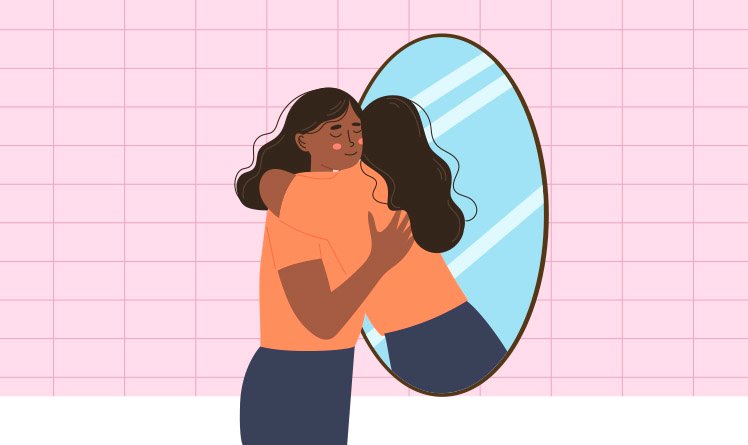Self-Compassion: A Complete Guide to Living with More Lightness, Courage, and Balance

|
Getting your Trinity Audio player ready...
|
We live in a world that demands results all the time. Whether at work, in relationships, or even in taking care of our bodies and health, we feel like we never do enough. This excessive self-criticism and perfectionism puts us in a constant cycle of pressure, exhaustion, and... blameThat's where self-compassion comes in—a transformative skill that teaches us to look at ourselves with more kindness and humanity.
However, practicing self-compassion doesn't mean complacency or giving up on your goals. On the contrary: it means creating a solid emotional foundation to face challenges with greater courage and balance. After all, if you can't be your own ally, how can you hope to move forward in the face of life's difficulties?
What is self-compassion?
Self-compassion is the ability to treat oneself with kindness, care, and understanding in moments of pain, failure, or imperfection. Researcher Kristin Neff, a pioneer in studies on the topic, defines self-compassion as "the ability to acknowledge one's own suffering and respond to it with warmth, rather than harsh criticism and judgment."
Many people confuse self-compassion with self-esteem. But there are important differences:
- Self-esteem is related to feeling valuable or competent compared to external standards or other people.
- Self-compassion It doesn't depend on comparison, but on acceptance. Thus, it's recognizing that making mistakes is part of the human condition and that you deserve support even in moments of failure.
And no, self-compassion isn't victimhood or weakness. Quite the opposite. Being compassionate toward yourself doesn't mean patting yourself on the back. Above all, it means creating the inner conditions to learn from mistakes, move forward, and recover more gracefully.
“Self-compassion is the ability to embrace yourself with kindness in the face of mistakes and difficulties, rather than responding with criticism and judgment.”
How to practice self-compassion in your daily life
Developing self-compassion is like cultivating an emotional muscle: the more you train it, the stronger it becomes. However, the difference is that this "training" doesn't require hours of dedication—it can (and should) be present in small moments of your daily routine.
1. A conscious look at internal dialogue
Much of our suffering comes from the way we talk to ourselves. Our brains don't differentiate very well between external and internal criticism. When you tell yourself things like "I'm a failure" or "I'm worthless," amygdala reacts as if facing a real threat, triggering cortisol and adrenaline.
Therefore, the practice is to replace judgment with acceptance. Whenever you catch yourself criticizing yourself, take a deep breath and rephrase: “I'm learning, and it's okay to make mistakes. I can do it differently next time.”
2. Mindfulness applied to self-compassion
Mindfulness is the fertile ground where self-compassion grows. In this sense, when we practice mindfulness, we create space between stimulus and response. This pause reduces automatic identification with self-criticism and opens space for us to respond with kindness.
A simple exercise is compassionate breathing: close your eyes, bring your attention to your breathing, and with each inhalation, mentally say, "I breathe in calm," and with each exhalation, "I breathe out criticism." Just five minutes a day can begin to change the neural circuits linked to emotional self-regulation.
3. The Self-Compassion Journal (compassionate journaling)
Writing is a powerful tool because it gives concrete form to what we feel. A Positive Psychology exercise is register daily three questions:
- “What was one mistake I made today?” (write without censorship).
- “How would I talk to a friend who had made the same mistake?”
- “What small action can I take tomorrow to better handle this?”
This process trains the brain to move away from the logic of punishment and toward the logic of learning and acceptance.
4. The “friendly part” technique (Neuro-Linguistic Programming – NLP)
In NLP, we can reprogram the internal dialogue Using the dissociation technique, imagine that the critical part of you is on one side, and on the other is the "friendly part" that wishes you well. Give this friendly part a voice: what advice and words of support would it have?
With repetition, the brain begins to create associations, reducing the weight of self-criticism and strengthening inner kindness.
5. Micro-practices of kindness in everyday life
Self-compassion doesn't have to be grand. It's strengthened by small gestures:
- In the mirror: When you wake up, look at yourself and say something positive — even if it’s just “I’m going to be kind to myself today.”
- On the body: When you feel tension, place your hand on your chest and take a deep breath. This will activate your parasympathetic nervous system, creating a sense of security.
- In the routine: When you make a mistake or forget something, replace “how stupid I was” with “ok, I made a mistake — it happens to everyone, I’ll fix it.”
6. Kristin Neff's Self-Compassion Tripod
Kristin Neff outlines three essential pillars for cultivating self-compassion:
- Self-kindness: talk to yourself with warmth rather than harshness.
- Shared humanity: remember that everyone makes mistakes, and that doesn't make you any less worthy.
- Mindfulness: observe thoughts and emotions without judgment.
Consciously practicing these three elements on a daily basis helps break automatic patterns of self-criticism.
7. Guided Self-Compassion Exercise (10 minutes)
1. Preparation (1 minute)
- Find a quiet place where you can sit comfortably.
- Close your eyes and take three deep breaths, feeling the air come in and out calmly.
- Place one hand on your chest as a welcoming gesture.
2. Recognizing the moment (2 minutes)
- Bring to mind a recent situation in which you criticized yourself or felt frustrated.
- Notice the emotions that arise: perhaps sadness, anger, shame, or disappointment.
- Say mentally: “I'm suffering right now. This is a difficult time.”
This is the first step: acknowledging the pain without denying it.
3. Humanizing the experience (2 minutes)
- Remember that all human beings make mistakes, fail, and face challenging times.
- Repeat mentally: “I'm not alone in this. Every human being goes through situations like this.”
- Allow yourself to feel that you are part of something bigger: the shared human condition.
4. Welcoming yourself (3 minutes)
- Imagine that you are in front of a great friend going through exactly the same situation.
- So what kind words would you say to him? Maybe something like: "You did the best you could," "To err is human," "You deserve to be treated kindly."
- Now, repeat these same phrases to yourself, silently, as a self-compassion mantra.
- Feel the effect of these words on your body: your breathing slowing down, your muscles relaxing, your mind finding more peace.
5. Integration (2 minutes)
- Take another deep breath and say: “I can be my own friend. I choose to treat myself with kindness.”
- Then, bring that feeling of welcome into the present.
- Finally, when you feel ready, slowly open your eyes, carrying this compassionate energy into the rest of your day.
“To practice self-compassion in your daily life, observe your inner dialogue, use mindfulness, write in a self-compassion journal, apply NLP techniques, and adopt micro-practices of kindness such as speaking kindly to yourself and placing your hand on your chest to calm yourself.”
Self-compassion and resilience
Life is full of ups and downs. Therefore, how we deal with setbacks is crucial to moving forward. Primarily, self-compassionate people tend to be more resilient because they can bounce back from failures without dwelling on them.
Furthermore, from a neuroscience perspective, self-compassion reduces excessive activation of the amygdala—responsible for automatic fear and stress responses—and strengthens areas linked to emotional self-regulation. This means less mental fatigue and more clarity in decision-making.
“Self-compassion strengthens resilience because it creates an internal space of acceptance that reduces the impact of stress and promotes recovery from difficulties.”
Self-compassion and its greatest enemies
Two great saboteurs often steal our peace: perfectionism and exaggerated self-criticism.
- Perfectionism: creates a cycle of eternal dissatisfaction. No matter how much you do, it always seems like not enough. This leads to procrastination and the feeling of never being ready.
- Severe self-criticism: constantly activates the stress system, releasing cortisol and putting the body and mind on alert. Over time, this leads to fatigue, anxiety, and even physical illness.
So, the solution isn't to "abandon standards," but to transform criticism into learning. So, ask yourself: “What can I learn from this to grow, instead of punishing myself?”
Self-compassion and physical health
When we treat ourselves harshly, our bodies respond as if we're in constant danger. Consequently, this chronic stress weakens the immune system, disrupts sleep, and even increases the risk of cardiovascular disease.
On the other hand, studies show that practicing self-compassion:
- Reduces levels of cortisol in the blood.
- Improves sleep quality.
- Reduces symptoms of anxiety and depression.
- Finally, it increases adherence to healthy habits, such as a balanced diet and physical exercise.
In other words, taking care of your mind with kindness also means taking care of your body.
Self-compassion applied in real life
Self-compassion isn't some far-fetched theory. It can—and should—be applied to all areas of life.
- In relationships: When we're kinder to ourselves, we avoid projecting our frustrations onto others. This results in more empathy and less pressure in relationships.
- At work: Instead of toxic productivity, we learn to balance performance with humanity. This way, we become more creative and less anxious.
- In the purpose of life: Self-compassion gives us the clarity to persist in our goals without carrying unnecessary weight. It's about walking lightly and consciously.
Self-compassion in toxic environments
Toxic environments —whether at work, in relationships, or even in family—drain energy and self-esteem. Above all, self-compassion acts as a shield, reminding you not to internalize external criticism, demands, or manipulation.
Useful practices:
- Mentally reinforce: “Other people’s words don’t define who I am.”
- Use mindful breathing techniques to reduce the immediate impact of stress.
- Maintain self-care routines as a form of emotional protection.
“Self-compassion helps us face toxic environments because it acts as an internal shield against external criticism and manipulation.”
Conclusion
Self-compassion is one of the most powerful skills for transforming mindset. Learning to be your own ally makes you more resilient, healthy, and capable of building balanced relationships. It doesn't eliminate challenges, but it changes how you respond to them.
Ultimately, be your own best friend. Treat yourself with the same kindness you offer to the people you love. This is the key to living with more lightness, courage, and purpose.
FAQ – Questions and Answers about Self-Compassion
1. What is self-compassion in a nutshell?
Self-compassion is the ability to treat yourself with kindness and understanding in times of pain or failure, rather than harshly criticizing yourself.
2. What is the difference between self-compassion and self-esteem?
Self-esteem depends on feeling competent or valuable compared to external standards. Self-compassion, on the other hand, doesn't require comparison: it's about acceptance and inner nurturing.
3. Doesn't self-compassion lead to complacency?
No. On the contrary, it strengthens healthy motivation. Self-compassionate people bounce back faster from failures and move forward with greater focus.
4. What are the physical benefits of self-compassion?
Reduced stress, improved sleep, strengthened immune system and increased adherence to healthy habits.
5. How to apply self-compassion in toxic environments?
Reinforcing self-support phrases, practicing mindfulness and maintaining self-care routines to avoid internalizing external criticism.
Recommended reading:
Self-Compassion: Stop Beating Yourself Up and Let Go of Insecurity – Kristin Neff
Image: Freepik

Marcel Castilho is an expert in neuromarketing, neuroscience, mindfulness and positive psychology. In addition to being an advertiser, he also has a Master's degree in NLP – Neurolinguistic Programming. As the owner and founder of the communications agency VeroCom and also of the digital agency Vero Contents, he has been studying human behavior for over 30 years.


